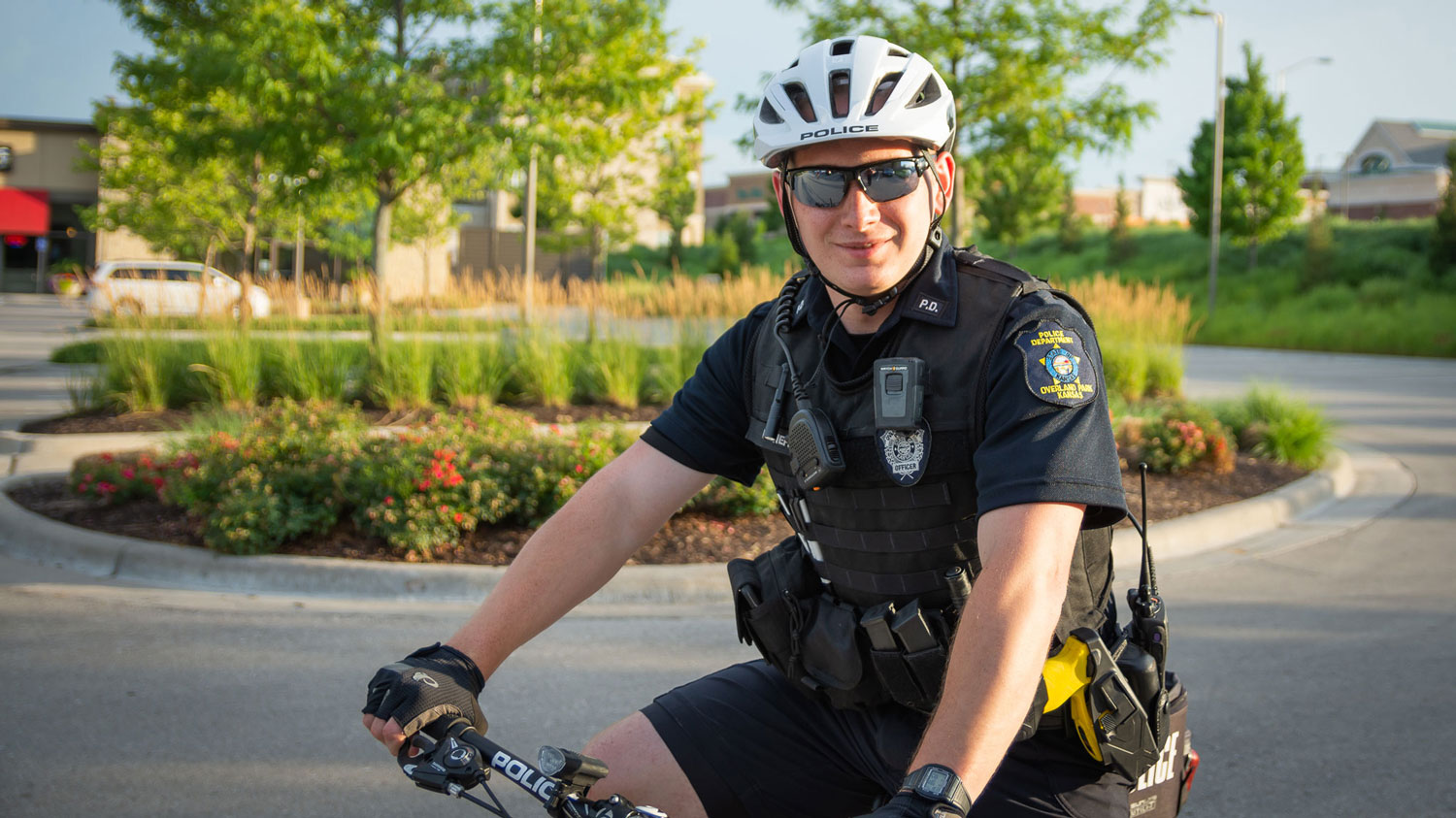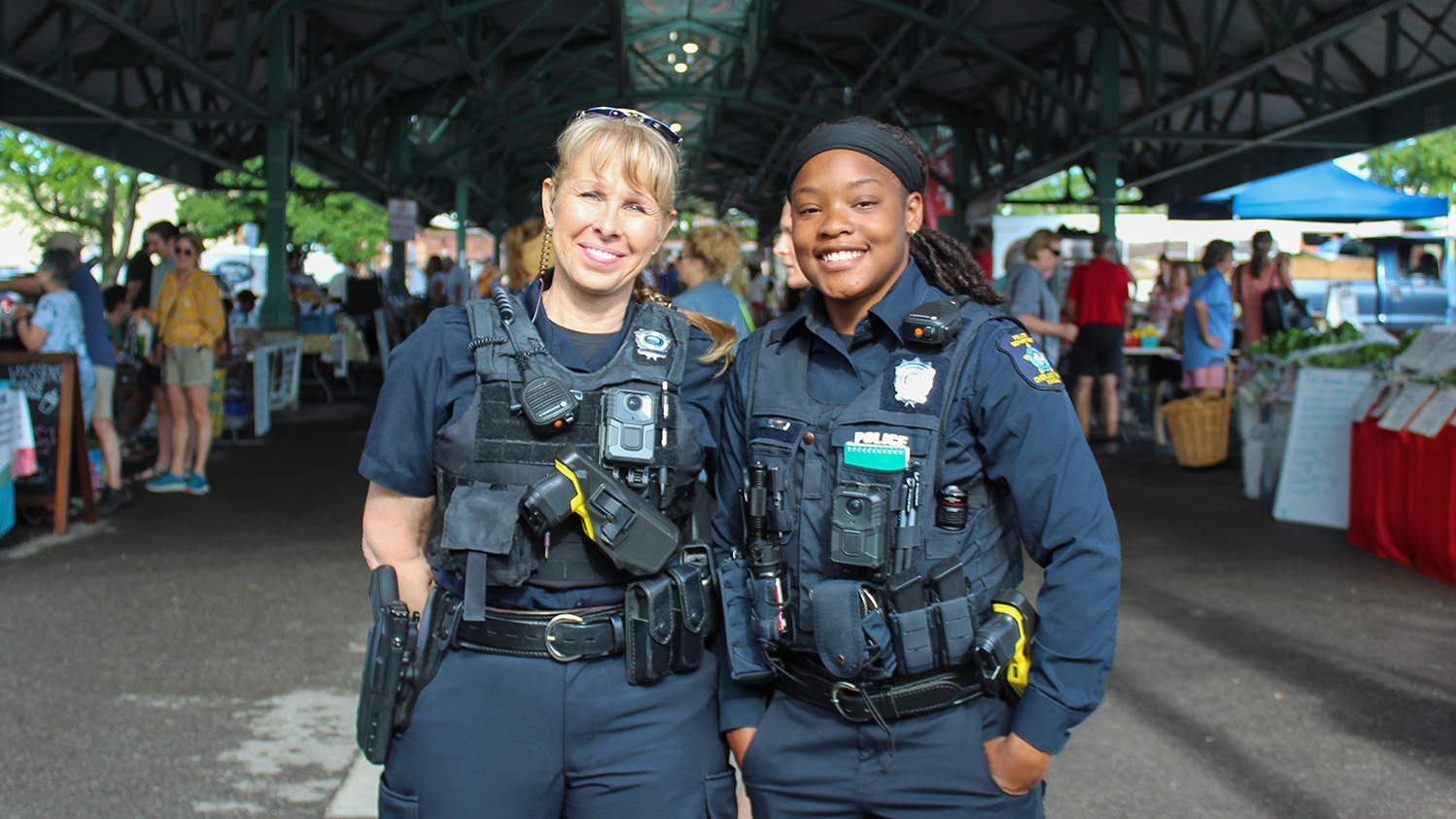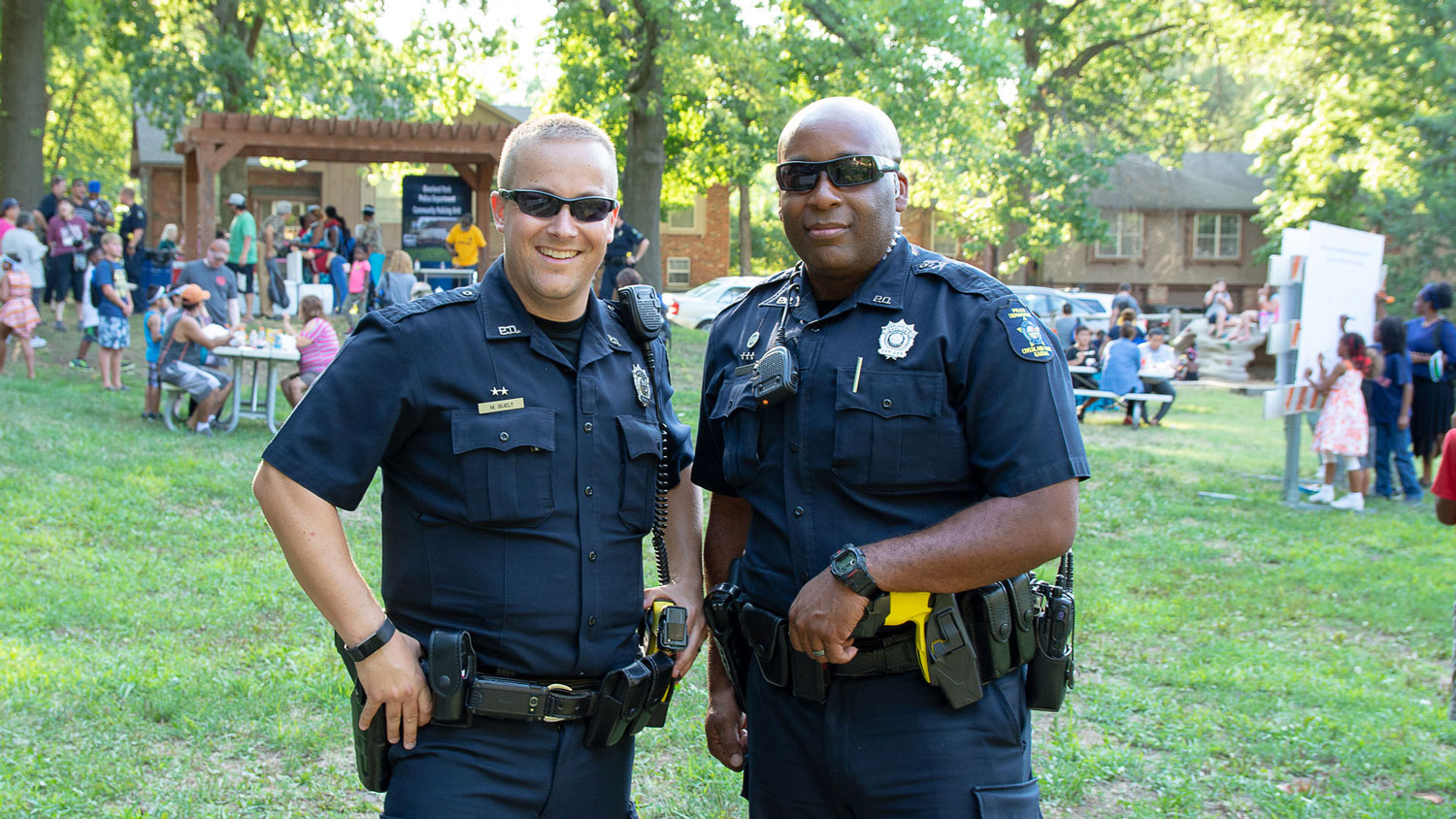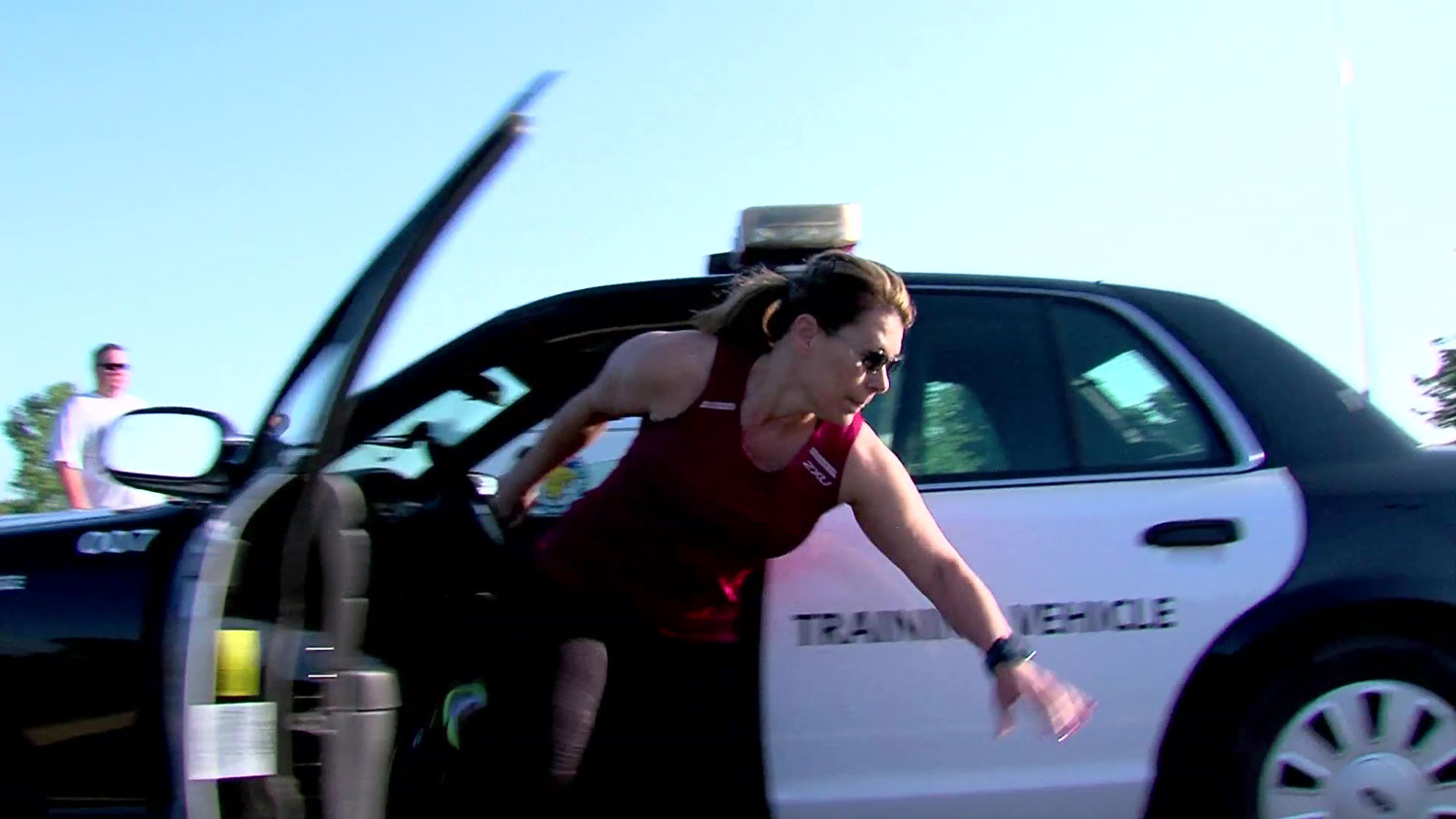OPPD Careers
Honor. Integrity. Duty.
If you have a heart for service, a drive to excel in an organization full of opportunities, and a desire to become part of something bigger than yourself, then the Overland Park Police Department is the place for you. Build a career with us.
Overland Park is looking for the best and brightest officers, dispatchers, and future department leaders.
Find out more about our hiring process and open positions below. If our department seems like a fit for you, we invite you to apply online or email a recruiter at pdjobs@opkansas.org.
Minimum Qualifications
Minimum eligibility requirements for police officer positions include:
- US citizenship
- 21 years or older
- Have a high school diploma or GED
- Pass a background check
- Live within 90 minutes of the Police Department
- Take and pass a physical agility test, written examination and interview
See a full list of qualifications before you apply.

Applications + Selection Process
- Apply for an open position, or contact a recruiter.
- Recruiters contact applicants to schedule interviews, typically within three weeks of the deadline date on the position listing.
- If you are selected, the city requires a pre-employment drug test, criminal background, and records check for all jobs.
- Once the position is filled, applicants will be notified.
Compensation + Benefits
Entry-level police officers earn $62,500 per year. Officers can earn up to $102,190 after 12 years. Salary for lateral entry is considered based on previous experience.
Overland Park offers health and dental insurance and defined benefit and defined contribution retirement plans.
The City also offers education assistance, paid time off, employee assistance programs and a wellness program.
Life With OPPD
OPPD embraces the community it serves, and that starts with our officers and staff. We work to make sure members of our department balance work and personal lives while learning, growing, and enjoying the work they do. See what a day on the job is like in our department.
Grooming Standards
Officers can wear tattoos and piercings on-duty in many cases.
Learn more about our tattoo policy and grooming standards.
Physical Agilities Test
Overland Park Police Officers must be ready to answer the call. This test assures applicants have the physical skills required to become a police officer.
Join OPPD
Our department offers on opportunity to build a career in a family-like atmosphere with high standards.
Whether it’s specialized training, state-of-the-art equipment, a chance to bond with the community you’re looking for, the Overland Park Police Department offers variety in your career.
Our city has a nationally-recognized reputation as one of the best places to live, and working for the city is no different. The Overland Park community respects, supports, and trusts our officers.
Ready to make a difference in Overland Park?
Now Hiring Dispatchers
Hear from the dispatch team members who serve as the connection between community members in need and the police officers who serve them about what makes this job so great. Then, apply online.
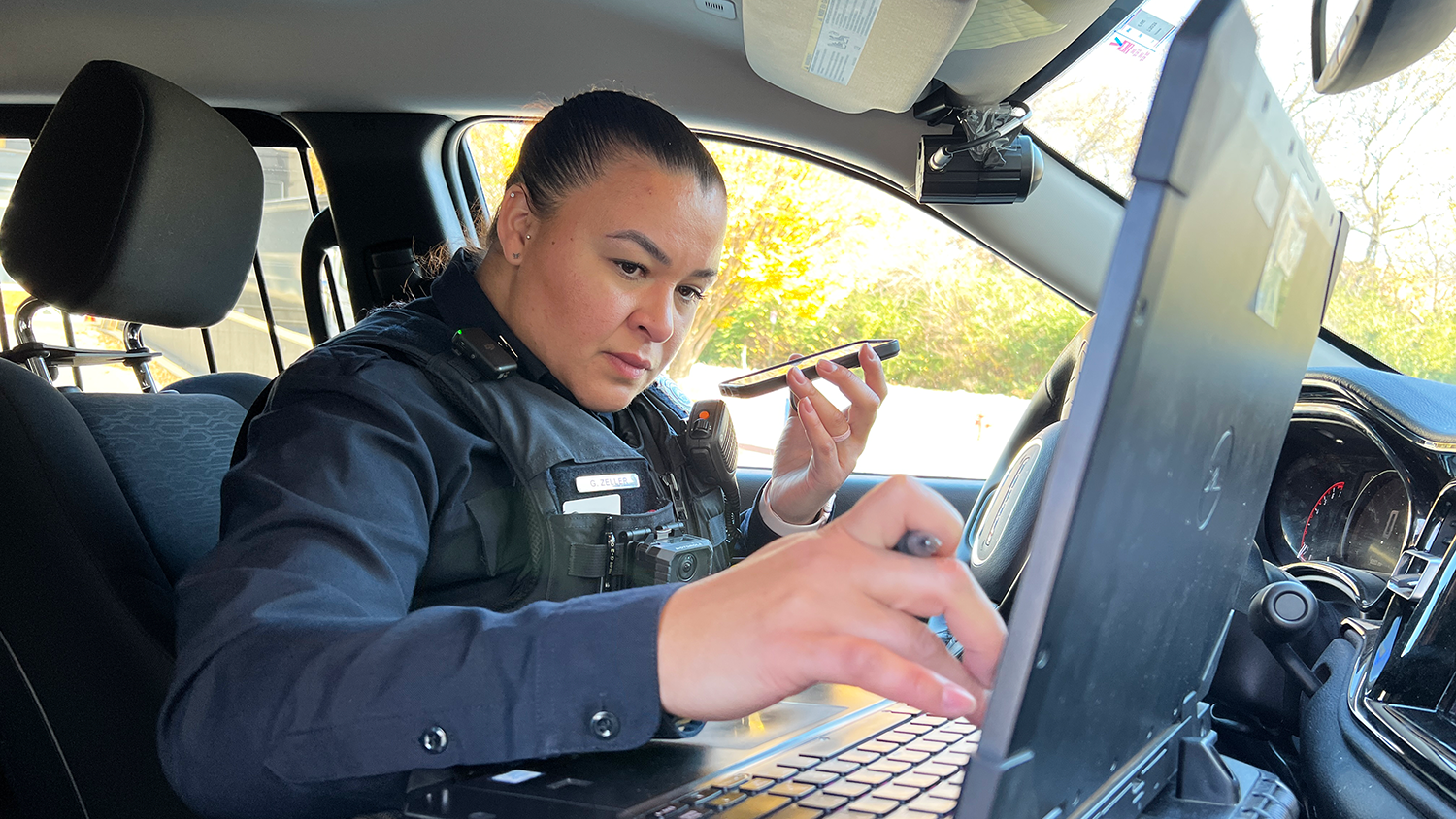
Life with OPPD
In a typical week, officers work five, eight-hour or four, 10-hour work days, depending on shift assignment. Overtime is occasionally necessary, and officers are paid time and one-half for assigned overtime.
Initial assignments are typical with the patrol division, which is staffed 24 hours a day by three work shifts and three relief teams. OPPD assigns officers to a team for a one-year period, through a bidding system. Transfers to specialized units such as investigations, dive team, K-9 are based on departmental needs.
Minimum Qualifications
All individuals interested in becoming an Overland Park police officer must meet specific minimum eligibility requirements. Eligible candidates:
- Are United States citizens,
- Are at least 20 years of age at time of application, and 21 years of age by date of hire,
- Have a high school diploma, GED, or evidence of equivalent achievement,
- Are able to respond from their residence to the Police Department within 90 minutes,
- Take and pass a physical agility test, a written examination, and an oral board interview,
- Successfully pass a Police Department-administered polygraph exam,
- Complete an in-depth background investigation,
- Complete and pass a physical and psychological examination from a licensed physician or practitioner after a conditional offer of employment,
- Complete and pass a drug screen,
- Achieve and demonstrate technological proficiency in the areas directly connected to daily assignments, and
- Achieve and maintain a level of physical fitness that allows officers to safely and competently perform the essential functions of the job.
Physical Agility Test
Applicants will complete a physical agility test which is currently in use at the Johnson County Regional Police Academy. This course was designed and validated by Stanard and Associates, and must be completed in 93 seconds or less.
The test course is approximately 200 yards in length and consists of the following items:
- Exit a patrol car and run on a paved surface that transitions to loose gravel and grass.
- Run down and back up a ditch.
- Go under a low-lying obstacle.
- Jump over a small bush.
- Climb over a fence.
- Run up and down stairs.
- Drop to his/her stomach.
- Stand back up.
- Move a 150-pound dummy a set distance.
Restrictions
Candidates may not have any immediate family members employed by the city in part-time or full-time capacities.
Overland Park does not have a city or state residency requirement. Officers must able to respond from their residence to the Police Department within 90 minutes.
Tattoos
Officers may have some tattoos or piercings displayed while working in an official capacity and while wearing a department uniform off-duty.
Tattoos that are not allowed include designs that include extremist affiliations or philosophies that advocate racial, gender, religious or ethnic hatred, intolerance or discrimination of any protected classes. Tattoos that promote or depict violence, lawlessness, criminal acts, nudity, sexual acts, vulgarity or profane language are not allowed.
Officers may not have tattoos displayed on their heads, faces, necks, scalps, hands or fingers. One exception to this rule is a tattoo simulating a wedding ring on the ring finger.
Tattoos must be covered when an officer attends judicial hearings, trials and any other event as directed by the police chief in an official capacity.
Past Criminal Activity
The activities outlined below will be reviewed on a candidate-by-candidate basis and may disqualify applicants:
- Must not have been convicted of, had a conviction expunged for or been placed on diversion or deferred judgment by any state or federal agency for a felony crime, or a misdemeanor crime of domestic violence, or a misdemeanor offense that reflects on the honesty, trustworthiness, integrity, or competence of the applicant. Commission of any other potential felonious act(s), detected or undetected, will be closely scrutinized on a case-by-case basis.
- Any sales, distribution, manufacturing or transporting of “any” illegal drug(s) will be closely scrutinized on a case-by-case basis.
- Must not have used any illegal drugs, with the exception of marijuana or synthetic marijuana, within the past 5 years.
- Must not have used, either illegally or legally, marijuana, synthetic marijuana, THC, or THC derivative (including edibles) within the past one year from the date of application.
- Preference will be given to applicants with no illegal prescription drug possession/usage within the last three years. The Chief of Police or designee will evaluate any deviation from this preference on a case-by-case basis.
- Right to legally own or use a firearm must not be revoked or curtailed under federal, state or local law, including but not limited to provisions of the Gun Control Act of 1968.
- Must not be currently charged with or under indictment for any criminal activity other than minor traffic violations.
- Must not be currently on criminal probation.
- Driving Record
Eligible candidates:
- Must possess a valid driver’s license prior to beginning employment with the City.
- May not have been convicted, plead guilty, plead no contest, or been diverted on four or more moving traffic violations within the past three years.
- May not have been convicted, plead guilty, plead no contest, or been diverted on a serious traffic violation within the past three years. Serious traffic violations include DUI, reckless driving, hit and run, vehicular homicide, transporting an open container of alcoholic liquor or cereal malt beverage, eluding a police officer, and negligent homicide.

